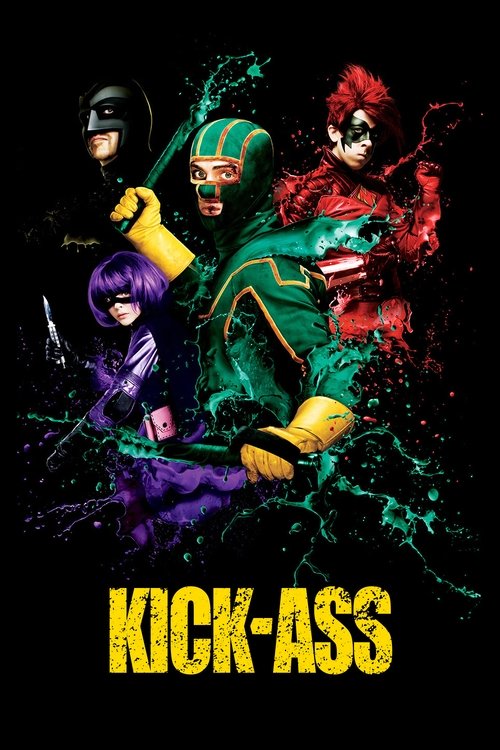
Title: Kick-Ass
Year: 2010
Director: Matthew Vaughn
Writer: Matthew Vaughn
Cast: Aaron Taylor-Johnson (Dave Lizewski / Kick-Ass),
Chloë Grace Moretz (Mindy Macready / Hit Girl),
Nicolas Cage (Damon Macready / Big Daddy),
Lyndsy Fonseca (Katie Deauxma),
Mark Strong (Frank D'Amico),
Runtime: 117 min.
Synopsis: Dave Lizewski is an unnoticed high school student and comic book fan who one day decides to become a super-hero, even though he has no powers, training or meaningful reason to do so.
Rating: 7.123/10
Punching Through the Superhero Satire: The Audacious Spirit of Kick-Ass
/10
Posted on August 1, 2025
Matthew Vaughn’s Kick-Ass (2010) bursts onto the screen with a kinetic audacity that both celebrates and skewers the superhero genre, blending hyper-violent spectacle with a surprising emotional core. Adapted from Mark Millar and John Romita Jr.’s comic, the film’s strength lies in its fearless screenplay, co-written by Vaughn and Jane Goldman, which navigates the tricky balance between irreverent humor and raw human vulnerability. The story follows Dave Lizewski (Aaron Johnson), an unremarkable teenager who dons a green wetsuit to become the vigilante Kick-Ass, only to stumble into a world of real danger and moral ambiguity. What sets the film apart is its refusal to sanitize the consequences of vigilantism, a choice that grounds its absurdity in a gritty reality.
Vaughn’s direction is a standout, wielding a stylized yet controlled chaos that mirrors the protagonist’s naive bravado. The action sequences particularly Hit-Girl’s (Chloë Grace Moretz) electrifying, balletic fights are choreographed with a visceral precision that feels both comic-book fantastical and jarringly real. Moretz’s performance is a revelation, stealing scenes with a ferocious charisma that overshadows Johnson’s earnest but occasionally flat lead. Her portrayal of Hit-Girl, a pint-sized assassin trained by her father, Big Daddy (Nicolas Cage), carries the film’s emotional weight, blending innocence with lethality in a way that challenges the audience’s moral compass. Cage, meanwhile, delivers a layered performance, his quirky Adam West-inspired cadence masking a tragic obsession that the screenplay wisely leaves understated.
The cinematography, by Ben Davis, amplifies the film’s tonal shifts, juxtaposing vibrant, pop-art colors in the comic-inspired sequences with darker, muted tones in moments of violence or introspection. This visual dexterity enhances the film’s commentary on the disconnect between superhero fantasy and real-world consequences. However, the music, while energetic, occasionally leans too heavily on generic rock anthems, missing opportunities to deepen the film’s emotional texture. The screenplay, for all its wit, stumbles in its pacing, particularly in the second act, where subplots involving Dave’s high school life feel underdeveloped and distract from the central narrative.
Kick-Ass is not without flaws, but its ambition to deconstruct superhero tropes while delivering a thrilling ride makes it a bold artifact of its time. It dares to ask whether heroism is born from courage or delusion, leaving viewers exhilarated yet uneasy an impact that lingers long after the credits roll.
0
0
